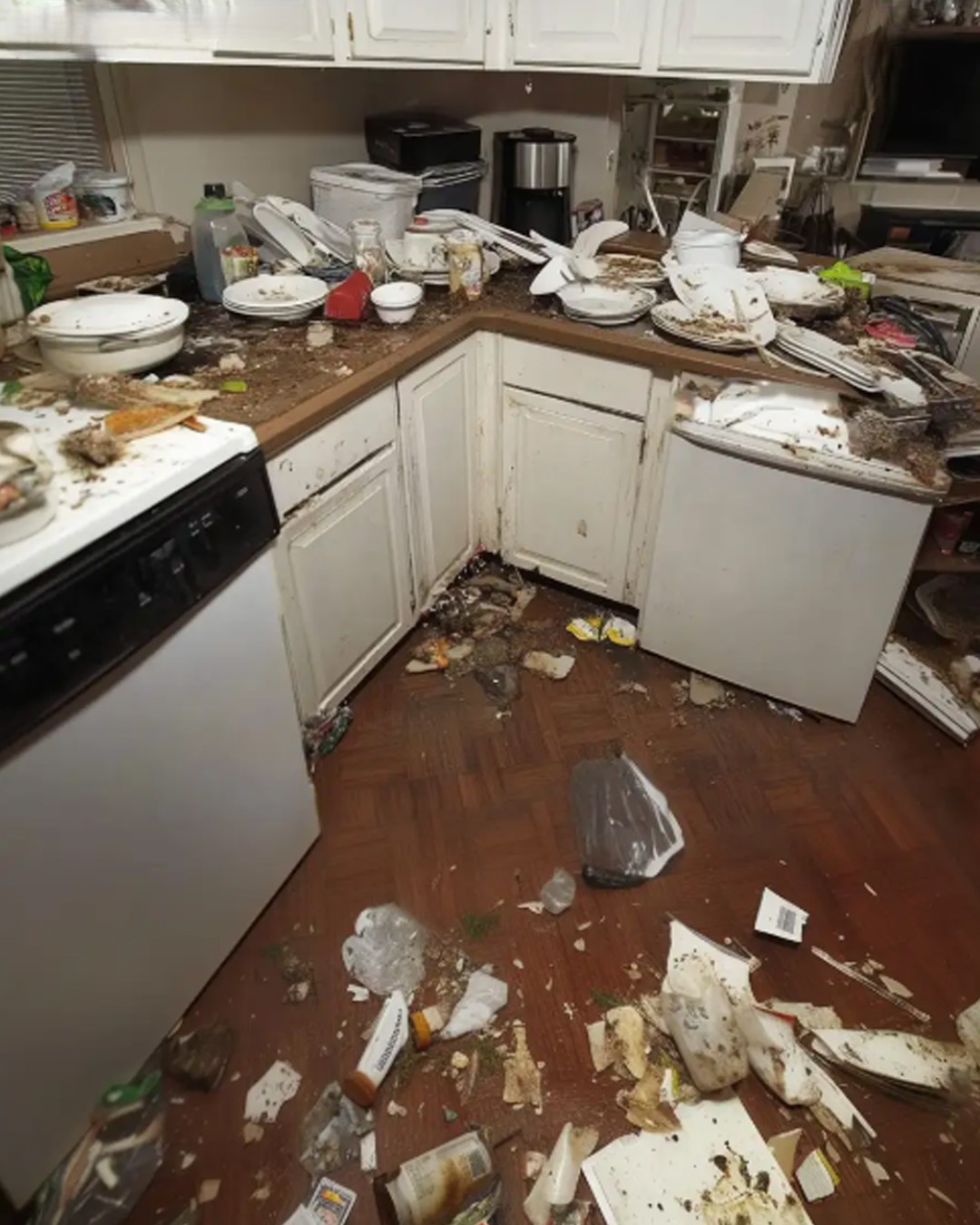Margaret sighed. “Her yard is overgrown, newspapers pile up on her porch, and when I checked on her last week, she barely opened the door. The house… well, it doesn’t seem like a safe place anymore.”
I had heard this kind of worry before—the kind that comes when someone is struggling alone.
“I’ll be there in an hour,” I promised. “What’s the address?”
After hanging up, I texted Ryan, my husband and business partner: Emergency clean-up. Not sure how bad yet. May need backup.
His reply came swiftly: On standby. Let me know.
I grabbed my “first assessment” kit—gloves, a mask, basic cleaning supplies, and a change of clothes. It was best to be prepared for anything.
Eleanor’s house was a modest one-story with faded blue siding. The lawn had grown wild, and dead flowers drooped in neglected window boxes. The mailbox leaned to one side, stuffed with unopened envelopes.
I knocked and waited. Nothing. A second knock, louder.
Finally, I heard shuffling footsteps. The door opened just an inch, revealing a sliver of a woman’s face.
She was pale, her tired eyes widening when she saw my company polo shirt.
“I don’t need a cleaning service,” she muttered, already pulling the door shut.
“I’m not selling anything,” I said quickly, keeping my tone soft. “Margaret asked me to come. She’s worried about you. She thought you might need help.”
Eleanor’s jaw tightened. “I can handle it myself.”
I recognized that resistance—the same way my mother used to react when concerned neighbors asked about our home.
“My mom used to say the same thing. ‘I can handle it.’ But sometimes, handling it means letting someone help,” I said gently. “That’s why I started my business—to clean for people who need a fresh start.”
“A fresh start…” Eleanor whispered the words like they were something out of reach.
Her eyes met mine, something flickering there—maybe hope, maybe exhaustion. After a long pause, her face crumpled.
“I don’t even know where to start,” she admitted.
“You don’t have to,” I reassured her. “That’s why I’m here. Maybe you could spend the day with Margaret while I work. It might be easier that way.”
Eleanor hesitated, then nodded. “Let me get my purse.”
Margaret welcomed her warmly, offering tea and conversation. With Eleanor settled, I returned to her house and called Ryan.
“Bring industrial garbage bags and maybe a respirator,” I told him.
He arrived shortly after, taking one look inside before exhaling sharply.
“She’s been living like this?” he asked.
I nodded. “For a while, I’d guess.”
The house wasn’t completely packed, but it felt heavy with neglect. Dishes stacked high in the sink, dust coated every surface, and the air was stale.
I pulled on my gloves and mask. “Focus on bagging up the obvious trash in the kitchen and living room. I’ll start in the bedrooms.”
Ryan nodded, already opening a trash bag. “Got it.”
As I moved through the home, I uncovered framed photographs on a dusty bookshelf—pictures of a young boy with dark curls, grinning at the camera, and another of him sitting on a man’s shoulders, both of them laughing. But something stood out: there were no photos of the boy past a certain age.
Then, in a second bedroom, I found something that stopped me cold.
A twin bed covered in dust, a model solar system hanging from the ceiling, its planets frozen mid-orbit. A dresser filled with neatly folded children’s clothes.
This wasn’t storage—it was a memorial.
A stack of birthday cards confirmed my suspicions. Each one was addressed to “Michael,” spanning his first birthday to his thirteenth. The last card’s handwriting was shaky but contained one heartbreaking phrase: “…would’ve been 13 today.”
By mid-afternoon, we had made significant progress. The living room was cleared, the kitchen organized, and the home began to feel lighter.
While sorting through a kitchen drawer, I found an old newspaper article folded neatly inside. The headline caught my eye: “Local Father Involved in Accident.”
The story detailed how Eleanor’s husband had been in a car accident while rushing to the hospital. The article didn’t mention what happened to their son, but the bedroom and the birthday cards told the rest of the story.
I needed to talk to Eleanor.
She sat at Margaret’s table, hands curled around a cold mug of tea. She looked up as I entered, eyes filled with silent questions.
I placed the newspaper in front of her. “I found this.”
Eleanor’s gaze lingered on it before shifting away. “I should have thrown that away years ago,” she whispered.
“But you didn’t,” I said softly. “And that’s okay.”
Margaret reached for Eleanor’s hand, offering quiet support.
“I kept his room the same,” Eleanor admitted, tears slipping down her cheeks. “At first, I couldn’t bear to change it. Then I couldn’t even go inside.”
“You’ve been carrying this alone for so long,” I said gently. “But you’re not alone.”
Eleanor exhaled shakily. “Is the house awful?”
“Nothing that can’t be fixed,” I reassured her. “We’ve made good progress. Want to see?”
She hesitated, then nodded.
As she stepped inside, she ran her fingers over the freshly cleaned surfaces, taking it all in. When she reached the door to the second bedroom, she paused but didn’t open it.
“Thank you,” she said, her voice full of emotion. “Thank you both.”
The next morning, she greeted us with a neatly combed hairstyle and a clean blouse.
“Margaret and I are going to pick out some plants for the garden,” she said, a hint of lightness in her tone.
“That sounds perfect,” I replied.
By the time we finished, the house was transformed—not perfect, but livable. Fresh. Hopeful.
As we packed up, Eleanor and Margaret sat at the kitchen table, sipping coffee, a warmth in the air that hadn’t been there before.
Ryan caught my eye. “Another successful clean slate?”
I nodded. “The best one yet.”

